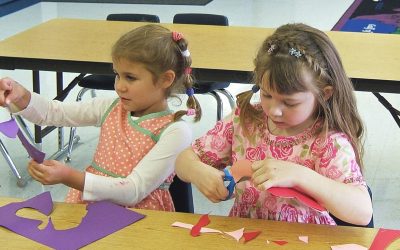“I’m bored!”
How many parents have heard those words, and wondered what to do? What follows here is information about what underlies boredom, plus strategies to help young children go from being idle to being happily productive.
ABOUT BOREDOM
Some children say, “I’m bored” often, others sporadically or at certain times of the day. There are those who experience boredom when circumstances are trying, worrisome, or confining (such as during a pandemic), or when things seem too difficult, easy, or repetitive. There are also kids who may be feeling lethargic or tired, or who lack a sense of purpose. And, lots of children are unable to figure out why they feel bored, they just know they do. They may really be feeling something else, such as confusion, disappointment, apprehension, or discouragement. Those are complex concepts for little ones to grasp, so it’s just easier for them to say, “I’m bored.”
Many parents hear those trigger words and jump to attention. After all, if their child is bored, shouldn’t they be at the ready to provide appropriate stimulation and take responsibility for keeping that child engaged and content?
No.
Parents should certainly be attuned to their child’s well-being, and safeguard family members’ health and well-being. However, parents should not try to “rescue” their child from boredom. That deprives kids of learning how to acquire initiative. It compromises enthusiasm, spontaneity, and creative expression, and robs them of the chance to become self-sufficient. Boredom can be constructive. It primes children to develop accountability for their own intellectual stimulation and can lead them to become intrinsically motivated.
Intrinsic motivation is a drive from within. It propels children forward. It sparks a search for information, generates action, and enhances curiosity. As children grow, motivation leads to autonomy, commitment, and the ability to balance activities and demands. It can also kindle pride, pleasure, and feelings of competence.
Parents who connect meaningfully with their children—who affirm their capacities, bolster their confidence, demonstrate resourcefulness, and show them how to use time wisely—are well-positioned to help kids find intrinsic motivation, and harness their own ways to dispel boredom.
DISPELLING BOREDOM: IMPORTANT QUESTIONS AND ANSWERS
What should parents pay close attention to when children complain of boredom?
Pay attention to children’s feelings, attitudes, and concerns. How are these affecting their attitude, and behavior? Talk to them about their individual interests and preferences. What does the child really like to do? How can you support that? Also, consider areas of strength and weakness in different domains, and the sorts of experiences that might be gratifying and appropriately challenging. Furthermore, think about influences (people, surroundings, or things) that could affect how the child is reacting at a particular time. Reflect upon any or all of this, including what might be altered so as to improve motivation.
What motivates young children?
Motivation can be fueled by many different factors—such as joy, suspense, past experiences, manageability, self-selected options, and satisfying connections with others. Motivation is associated with triggers such as instinct, curiosity, and personal needs. Young children are often motivated if they receive genuine praise, encouragement, and reinforcement, including helpful feedback about their efforts and achievements. Kids develop motivation when they anticipate success, and when they experience enjoyment through understanding or pride in accomplishment. And, they become more industrious, self-directed, and motivated to try something if they sense a supportive climate.
Here are 10 targeted suggestions to enable intrinsic motivation to emerge: flexibility; choice; respect for the uniqueness of the individual; surprise; change of scenery or environment (including outings); humor; breaking tasks into manageable steps; fair expectations: a little technology; and reassurance.
How can I stimulate motivation when my child complains of boredom?
Here are 8 strategies:
1. A framework for positive action starts by getting calm and feeling capable. Encourage children to talk about what makes them curious, confident, and happy. Help them notice new ways of looking at things inside, outside, all around, and together—by asking questions and finding fresh opportunities to generate interests.
2. Tap the senses. Ask, “What can you see, hear, touch, taste, feel, and smell?” Multi-sensory experiences can be exciting, and provide renewed insights and energy. Show this by discussing examples—in nature, within stories, at home, or elsewhere.








